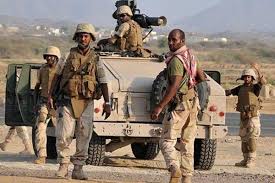Yamanyoon- Jan 6, 2018
Saudi Arabia, already economically challenged, has decided to pay out an extra 5,000 Saudi riyals (1,333 US dollars) monthly to the troops fighting on the front lines in the Saudi-led war on Yemen, where reports have drawn a dark picture of Saudi-led military personnel’s morale.
King Salman ordered the raise on Saturday. He was trying to compensate all state employees, almost a week after the country almost doubled gasoline prices and introduced a five-percent value added tax (VAT) on most goods and services.
Saudi Arabia started the war on Yemen in March 2015, hoping that with blunt force, it would be able to restore power to a former Yemeni regime that had been friendly to Riyadh in a matter of weeks. Some three years and over 13,600 Yemeni lives later, the Saudi regime has been unable to accomplish the objectives of its “Decisive Storm” operation.
Instead, and despite the coalition’s superior aggregate military power, Riyadh has been bogged down in a war against mostly tribal fighters with limited fighting equipment.
Even so, there have been reports that the Saudi-led forces are massively concerned about their safety. Officials from the United States, which assists the Saudi-led coalition, have admitted that incompetent Saudi pilots, fearing ground fire, have been flying their jets so high that they can’t deliver weapons accurately, causing even bigger civilian casualties.
The move by the Saudi king to raise allowances for the military personnel has now been seen as an incentive in monetary form — as is typical of the Saudi government — to keep the reluctant forces in the war zone.
Saudi Arabia, already economically challenged, has decided to pay out an extra 5,000 Saudi riyals (1,333 US dollars) monthly to the troops fighting on the front lines in the Saudi-led war on Yemen, where reports have drawn a dark picture of Saudi-led military personnel’s morale.
King Salman ordered the raise on Saturday. He was trying to compensate all state employees, almost a week after the country almost doubled gasoline prices and introduced a five-percent value added tax (VAT) on most goods and services.
Saudi Arabia started the war on Yemen in March 2015, hoping that with blunt force, it would be able to restore power to a former Yemeni regime that had been friendly to Riyadh in a matter of weeks. Some three years and over 13,600 Yemeni lives later, the Saudi regime has been unable to accomplish the objectives of its “Decisive Storm” operation.
Instead, and despite the coalition’s superior aggregate military power, Riyadh has been bogged down in a war against mostly tribal fighters with limited fighting equipment.
Even so, there have been reports that the Saudi-led forces are massively concerned about their safety. Officials from the United States, which assists the Saudi-led coalition, have admitted that incompetent Saudi pilots, fearing ground fire, have been flying their jets so high that they can’t deliver weapons accurately, causing even bigger civilian casualties.
The move by the Saudi king to raise allowances for the military personnel has now been seen as an incentive in monetary form — as is typical of the Saudi government — to keep the reluctant forces in the war zone.





